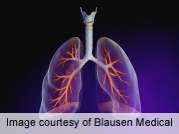Airborne particulates beyond traffic fumes affect lung health

(HealthDay)—Ambient particulates with median aerodynamic diameters of <10 µm (PM10) seem to cause more injury to airway epithelial cells (AEC) than traffic-derived airborne particulate matter, according to a study published online Sept. 14 in Respirology.
Rakesh K. Kumar, M.D., Ph.D., from the University of New South Wales in Sydney, and colleagues examined the response of AEC to PM10 or PM2.5 from the metropolitan region of Sydney (Sydney PM10 or PM2.5). These responses were compared with the response of AEC to traffic-derived particulates from the exhaust stack of a highway tunnel or to control (inert carbon black).
The researchers found that messenger RNA expression and secretion of proinflammatory cytokines interleukin 6 (IL-6) and chemokine (C-X-C motif) ligand 1 (CXCL1) were strongly stimulated by Sydney PM10 in mouse tracheal AEC. In human AEC, PM10 stimulated expression of IL6, IL8, and IL1B. PM10 contained higher levels of elements associated with dusts of geological origin in mass spectrometric analysis, whereas higher levels of various organic compounds were found in tunnel soot. In mouse AEC, nether expression nor secretion of CXCL1 was stimulated by Sydney PM2.5 or Sydney PM10 collected during a period including a major dust storm, both of which contained lower levels of iron.
"Ambient PM10 is likely to be more important than traffic-derived PM in causing injury to AEC leading to production of pro-inflammatory cytokines," the authors write.
More information:
Abstract
Full Text (subscription or payment may be required)
Copyright © 2014 HealthDay. All rights reserved.




















